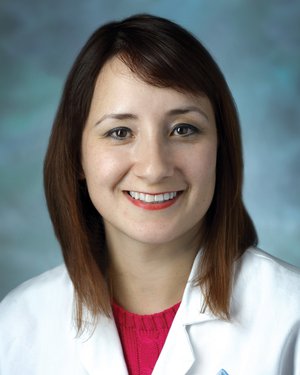Restless Legs Syndrome and Cortical Excitability
Overview

| Registration |
|---|
Hosted by the Anatomy department. Light refreshments will be served. |
Target Audience
Des Moines University faculty, staff, and students.
Purpose
Dr. Salas's independent research focus is on the neurobiological mechanisms underlying sleep disorders, particularly, Restless Legs Syndrome (RLS) and insomnia, which remain poorly understood. She has used methodology of non-invasive cortical stimulation techniques (i.e., transcranial magnetic stimulation) to further investigate sleep disorders. Her presentation will focus on her work on studying cortico-motor excitability in the primary motor cortex (M1), along with examining the relationship to the clinical aspects of RLS and sleep parameters.
Learning Objectives
- Define Restless Legs Syndrome (RLS).
- List the diagnostic clinical features of RLS.
- Describe cortical excitability changes associated with RLS.
Location

Des Moines University is located on a 22-acre campus in the heart of Des Moines, Iowa. Just west of downtown on Grand Avenue, the University is located in one of Des Moines' most prestigious neighborhoods. The campus is in a historic neighborhood filled with tree-lined streets and gracious older homes and businesses. Its central location makes it easy to access the rest of the city and outlying communities. The campus is close to the Des Moines International Airport, located on the bus line and just blocks from local shopping and downtown Des Moines.
Speaker(s)
Rachel Marie E. Salas, MD, MEdHP, FAAN
Associate Professor, Neurology and Nursing at Johns Hopkins Medicine
Director, Interprofessional Education and Interprofessional Collaborative Practice
Director, Neurology Clerkship
2019-2021 Josiah Macy Jr. Faculty Scholar
Dr. Rachel Salas' primary area of research interest involves exploring the underlying mechanisms of sleep and chronic sleep disorders such as insomnia and Restless Legs Syndrome (RLS). More specifically, her long-term goal is to better understand changes in cortical activity associated with insomnia and RLS, in order to improve treatment for these conditions.
In addition to her clinical research, Dr. Salas is involved in medical student, resident, and fellow education and currently serves as the Co-Director of the Neurology Core Clerkship for Medical Students and is the Co-Director for the Neurology Resident and Neurophysiology Fellow JHH Sleep Rotation. She is particularly interested in enhancing sleep education at all levels. As the primary investigator in the neurobiology of sleep, done in the spirit of the new era of collaborative research, she has been a co-investigator on other collaborative sleep scholarship projects in effort to remain diverse in the domain of sleep medicine. She is a co-author on manuscripts on my collaborating projects evaluating sleep in the following populations: HIV (sleep patterns and a second on cognition and sleep), Black minorities in Baltimore, one in Parkinson disease and REM behavioral sleep disorder, and is currently the PI on a collaborative project assessing the sleep environment in effort to validate a sleep environmental inventory that she created.
Dr. Salas attended St. Mary’s University in San Antonio where she received a BS in biology. She went on to earn her medical degree at The University of Texas Medical Branch at Galveston where she also completed her medical internship and Neurology residency. After her Chief Resident year, Dr. Salas completed a two-year Sleep Medicine fellowship at Johns Hopkins School of Medicine.
CE Credits
Available Credit
- 1.00 CE Contact Hour(s)

 Facebook
Facebook Twitter
Twitter LinkedIn
LinkedIn Forward
Forward